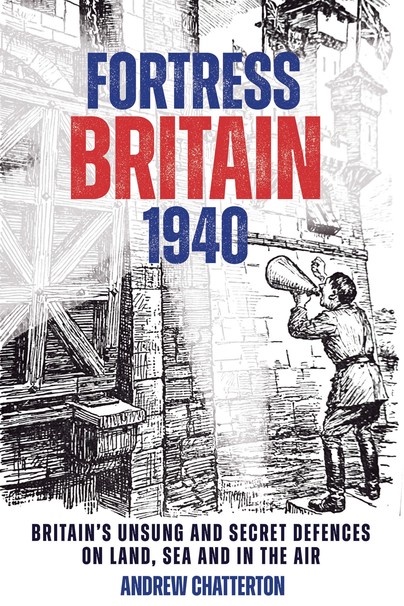Fortress Britain 1940 (Hardback)
Britain's Unsung and Secret Defences on Land, Sea and in the Air
(click here for international delivery rates)
Need a currency converter? Check XE.com for live rates
Alone, unprepared and weak. These are generally the words used to describe Britain’s position in 1940, part of a narrative that has been built up ever since the end of World War II. However, the reality is very different. On land, sea and in the air, Britain was prepared. It had the most powerful navy in the world; the RAF was relatively strong, but more importantly, was operating as part of a plan and a joined-up group system that was in reality never in any real danger of being defeated; even the post-Dunkirk British Army was better armed than the post-war narrative tells us. These forces were backed up by the Home Guard, and thousands of men and women in secret roles ready to help fight the invasion of the country. Even if all of this had gone wrong and the Nazis had defeated Britain militarily then a separate, highly secret civilian group were ready to become active only after the occupation had started.
One word associated more than any other during this period of the Second World War is ‘Alone’ – Churchill played upon this in his speeches but in 1940, Britain had a hugely powerful empire. Although in many cases this support was thousands of miles away, the Empire and other Allies would have played a huge role had the Germans had invaded, one that has been overlooked in many accounts.
“The book demonstrates that there was much more to our plans than is more widely known and makes for interesting reading. There as still some aspects for which documents are still not in the public domain, and people who never told their families what they had volunteered to do in the event of invasion in 1940. I found it a very interesting read.”
Military Model Scene
“A story of sheer determination and ruthlessness in the defence of Britain.”
Dr Helen Fry
“A revelatory and brilliantly researched new work. Compelling, illuminating and richly detailed.”
James Holland
“Turns our popular narrative on its head. This is important, shocking and impressive.”
Dan Snow
For his second book, Andy returns to 1940 to take a much broader look at Britain's defences before the expected German invasion, Operation Sealion.
History Book Chat
It will always be a period best remembered for the 1.6m volunteers who joined the LDV, later called the Home Guard, that answered the Government's call via radio broadcasts.
Here readers will learn that there was far more being planned for the arrival of enemy forces.
With the vast majority of Britain's stock of military equipment & ammunition abandoned in France following the evacuation at Dunkirk, it was thought Britain only had a matter of weeks to get itself prepared for war on British soil.
In huge numbers, a variety of pillboxes were erected in strategic places, often to project airfields & the railways.
Andy also explains the role of stop-lines further inland. These were a series of anti-tank obstructions, barbed wire, road blocks & land mines, located to slow down an advancing enemy, thus allowing for a mobile force to arrive & engage.
Once again Andy's knowledge of the Auxiliaries, Britain's own voluntary resistance force, shines through with more stories & eyewitness accounts covering their recruitment, training & what their roles would be.
It was not just the men chosen for their knowledge of the local area, but women & children would also have an important part to play. Given extremely dangerous jobs in what would then be behind the invading forces, it would be described by many as a suicide mission.
No German invasion crossing the English Channel would ever be truly successful when faced with the size of the Royal Navy. This is a fact that has often been overlooked as the Battle of Britain took place in the skies above.
Germany's navy had already suffered significant losses during the invasion of Norway.
When the Royal Navy then attacked the French fleet at Mers-el-Kébir, sinking several ships in the port, this was also a vital loss to the German navy. Had these ships fallen into German hands following the French Armistice, they would undoubtedly have been used against Britain & its allies.
Fighter Command & 'the few' deservedly get a huge amount of praise & respect for their role in the Battle of Britain. Throughout the following decades, books & films have constantly kept these incredible stories in the minds of the general public, but has unconsciously helped to keep in the shadows the role & sacrifices made by the men of Bomber Command. In slow & outdated bombers they constantly attacked the ports where invasion barges were gathering, as well as carrying out essential mine laying duties. The losses those bomber squadrons suffered at this time, deserves to be better known & thankfully Andy provides a timely reminder of this, along with the contributions made by the Royal Navy's submarines & the Royal Navy Patrol Service.
As we now know, Operation Sealion was postponed numerous times. Many books & historians will say the truth is that it was never likely to be successful. In 1940 Britain could not take that chance.
I have read a number of books on the subject around 1940, especially since learning that my great uncle was in the Home Guard. I have found a lot of new information here to savour. It is a fascinating & extremely well researched account & much like his first book, deserving of the highest praise. An excellent read.
















